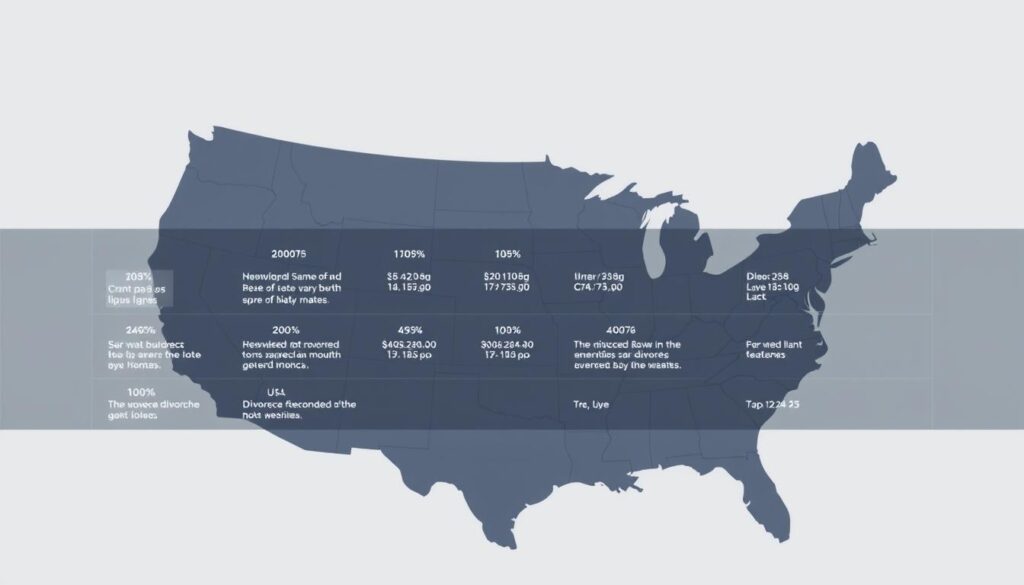Are you at a crossroads, wondering about the journey of divorce? The timeline for divorce in the United States varies greatly. Knowing how long it takes can help you move through this tough time with confidence.
Thinking about how long a divorce lasts? The answer changes a lot. Most divorces in the US take a few months to a year. This depends on state laws, how complex the assets are, and if both sides agree.
Every divorce is different, based on personal situations, legal rules, and feelings. Whether it’s a simple split or a complex legal battle, knowing what to expect is key. It helps with both emotional and practical preparation.
Table of Contents
Understanding the Basics of Divorce Timeline
Starting your divorce journey can feel daunting. But knowing the basic timeline helps you get ready. The time it takes varies a lot, based on several key factors. Your unique situation will affect how long it takes.
There are different types of divorce, each with its own timeline:
- Uncontested Divorce: The quickest, usually done in 2-4 weeks
- Contested Divorce: Takes longer, from 6 months to 2 years
- Collaborative Divorce: Faster than traditional contested divorces
Initial Legal Steps in Divorce
The divorce process starts with important first steps:
- Filing the divorce petition
- Serving divorce papers to your spouse
- Responding to the initial filing
- Negotiating terms of separation
“Knowing the process can help reduce stress and uncertainty during divorce proceedings.” – Legal Experts
Essential Legal Requirements and Paperwork
Your timeline depends on meeting legal requirements. Each state has its own rules. But most need:
- Residency verification
- Comprehensive financial disclosure
- Detailed documentation of assets and debts
- Potential mandatory waiting periods
Understanding these basics can help you prepare for challenges. It might even make your process smoother.
Factors That Impact Divorce Duration

How long a divorce takes can vary a lot. Your situation can really affect how fast or slow it goes. This is because of many important factors.
Several key elements determine the complexity and timeline of your divorce:
- Level of spousal cooperation
- Financial portfolio intricacy
- Child custody considerations
- State-specific legal requirements
Divorce complexity impact is clear in contested cases. Uncontested divorces usually take 3 to 6 months. But, contested cases can take over a year. If both sides work together, it goes faster.
“The path of least resistance often leads to the fastest resolution” – Family Law Expert
Financial talks are key in divorce length. Complex money issues, like dividing assets and valuing businesses, can slow things down. Couples with complex finances might need more time because of expert opinions and detailed paperwork.
Court schedules and local resources also play a part. If courts are busy, it can take longer. Being prepared and having good legal help can help avoid delays.
State-Specific Divorce Laws and Requirements
Understanding state divorce laws can be tricky. Each state has its own rules for ending a marriage. Knowing these rules is key to managing your divorce well.

States have different rules that affect how long your divorce takes. Important things to think about include where you must live, waiting times, and how long it takes to get through court.
Residency Requirements Across States
Every state has its own rules for where you must live to file for divorce. For example, California has:
- Minimum of six months state residency
- Three months residency in the filing county
- Proof of continuous living in the state
Mandatory Waiting Periods
Waiting periods can make your divorce take longer. In California, there’s a standard six-month wait after divorce papers are served.
| State | Residency Requirement | Waiting Period |
|---|---|---|
| California | 6 months | 6 months |
| New York | 1 year | 30 days |
| Texas | 6 months | 60 days |
Court Processing Considerations
How fast courts work can vary. Uncontested divorces usually go faster, taking weeks to months. But, contested divorces with complex issues can take over a year.
Knowing your state’s divorce laws can help you prepare and speed up the process. Getting advice from local lawyers is the best way to understand your situation.
How Long Does a Divorce Take

Understanding the divorce timeline can be complex. It varies widely based on many factors. Some divorces are quick, while others take years.
The timeline depends on several key elements:
- Type of divorce (contested or uncontested)
- State-specific legal requirements
- Complexity of asset division
- Child custody arrangements
- Level of cooperation between spouses
Here’s a breakdown of typical divorce timelines across different scenarios:
| Divorce Type | Typical Duration | Key Characteristics |
|---|---|---|
| Uncontested Divorce | 31-90 days | Minimal conflict, quick resolution |
| Collaborative Divorce | 6-12 months | Cooperative approach, mediated settlement |
| Contested Divorce | 1-3 years | Complex disputes, potential court trials |
Your specific divorce timeline can be influenced by unique circumstances. Custody disputes and complex financial portfolios often extend the divorce process duration. Most states require a mandatory waiting period, which can range from 30 to 90 days after filing.
To expedite your divorce timeline, consider collaborative approaches. Maintain open communication and work with experienced legal professionals. They can help streamline the process.
The Role of Asset Division in Timeline
Going through a divorce can affect how you divide your assets. The complexity of dividing assets is a big factor in how long your divorce will take.
When there are big financial portfolios, the divorce gets more complicated. Couples with lots of assets face special challenges that can make the divorce longer.
Complex Financial Portfolios
Your financial situation can really affect how long your divorce takes. Here are some important things to think about for complex asset divisions:
- Multiple property ownership
- Business interests and investments
- Retirement accounts and pensions
- Stock options and deferred compensation
Property Valuation Process
Getting the value of your property right is very important. In Texas, courts use certain methods to make sure everything is fair:
| Valuation Method | Key Characteristics |
|---|---|
| Asset-Based Approach | Evaluates total asset value and net worth |
| Market Approach | Compares similar assets in current market |
| Income Approach | Assesses potential future earnings |
Debt Division Considerations
Dealing with debt can be as tricky as dividing assets. Equitable distribution doesn’t always mean splitting everything 50/50. Courts look at many things:
- Each spouse’s earning potential
- Financial obligations
- Contributions to the marriage
- Fault in marriage dissolution
Knowing about the details of dividing marital assets can help you guess how long your divorce might take. It can also help you get ready for what’s ahead.
Impact of Children on Divorce Duration
Divorces with kids are much harder and can make the process longer. The issues of child custody, support, and parenting plans add to the complexity. These factors greatly affect how long your divorce will take.
Children’s ages are key in how divorce affects them. Each age group needs a special approach to help them cope emotionally:
- Toddlers (3-6 years) may feel they caused the split
- Elementary school kids (6-12 years) face big emotional challenges
- Teenagers might take sides, making things harder
When kids are involved, divorce gets even more complicated. Courts always put the kids first. They look at who can be the best parent, who will pay for what, and who will get custody. This detailed check can make divorce take longer.
Working together can make divorce shorter. Creating a good parenting plan with your spouse can avoid many legal issues. This plan helps keep your kids stable.
Half of all marriages in the U.S. end in divorce, and kids often struggle emotionally during this time.
Important things that affect how long divorce takes include:
- Creating a fair custody schedule
- Figuring out child support
- Thinking about how divorce affects kids’ feelings
- Deciding who makes big decisions for the kids
Keeping a routine and avoiding fights can make divorce easier. It can also help protect your kids’ well-being and shorten the divorce process.
Contested vs. Uncontested Divorce Timelines
Going through a divorce can be tough, with big differences between contested and uncontested cases. Knowing these differences helps you get ready for what’s ahead and set the right expectations.
The time it takes for a divorce changes a lot, depending on if it’s contested or uncontested. Your journey depends on how well you and your spouse work together during the separation.
Understanding Contested Divorce Length
Contested divorces mean big disagreements that can make your divorce take longer. Some common issues include:
- Disputes over who gets what property
- Arguments about who gets custody of the kids
- Complications with spousal support
- Complex financial situations
In Texas, contested divorces can last from 9 months to several years. They often take more than 12 months, with legal costs ranging from $10,000 to $30,000.
Expedited Uncontested Process
Uncontested divorces are a different story. If you and your spouse agree, you can make your divorce much quicker:
- Typical time: 60 to 90 days
- Average cost: $1,000 to $3,000
- Less court time
- Less stress
“The fastest way through divorce is mutual understanding and cooperation.”
Mediation Timeline Effects
Mediation can be a big help in managing your divorce timeline. In Texas, courts often require mediation for contested cases. This can cut down on court time and costs.
Your divorce timeline really depends on how you communicate, your willingness to compromise, and how complex your situation is.
Court Procedures and Processing Times
Going through the court procedures in a divorce can really affect how long it takes. The process has many stages, each with its own challenges and delays.
Court processing times change based on several important factors:
- Case complexity
- Court availability
- Jurisdictional requirements
- Volume of pending cases
The usual time for a divorce in court can be 6 months to 2 years. If you and your spouse agree on everything, it goes faster. But if you disagree, it can take longer.
“The court’s schedule, not your personal timeline, often drives the divorce process.” – Family Law Expert
Important court steps that affect your divorce timeline include:
- Initial filing and document submission
- Mandatory waiting periods
- Mandatory mediation sessions
- Discovery phase
- Settlement negotiations
- Trial or final judgment
Every state has its own rules for court procedures. Knowing these can help you plan better and maybe make your divorce faster.
Strategies to Speed Up the Divorce Process
To speed up your divorce, you can take several steps. Mediation is a key strategy. It involves working with a neutral third party to find agreements. This can avoid long court battles.
Collaborative divorce is another way to make your divorce faster. In this method, both sides work with lawyers who want to solve problems, not fight. This approach can make the process less stressful and expensive. Being well-prepared and keeping communication open also helps.
Choosing a good divorce lawyer is important. They know the court system well. They can help you avoid delays and make sure everything is filed on time. This can make your divorce much quicker.
Being willing to compromise can change your divorce experience. If you focus on finding solutions, you might save money and emotional stress. This approach can make your divorce less painful.
FAQ
How long does a typical divorce take in the United States?
What is the difference between a contested and uncontested divorce?
Do state laws significantly impact divorce duration?
How do children complicate the divorce timeline?
What factors can delay a divorce?
Can mediation help speed up the divorce process?
What documentation is crucial for a smooth divorce process?
How does asset complexity impact divorce duration?
There are no reviews yet. Be the first one to write one.

